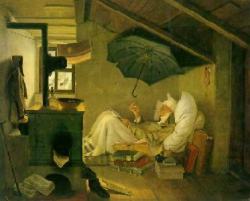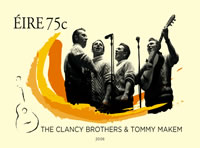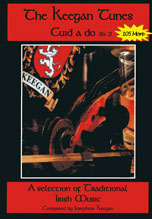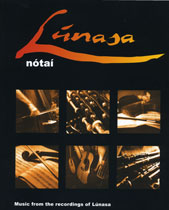FolkWorld Issue 33 05/2007; Book Reviews by Walkin' T:-)M
T:-)M's Night Shift
Irish Songs and Irish Tunes
 "Ballads will never die out," says Johnny McEvoy.
"People have been singing ballads since the
beginning of time; ballads of the American Civil War, ballads of Irish
Rebellion, going back hundreds and hundreds of years. The ancient man sang
about hunting, and slaying animals. He told stories about the old people
that lived before them and the happy hunting grounds and where they would
go when they died. They sang of the battles and wars with the enemy. They
sang and they told their stories in their tents and around their campfires.
Ballads were there since time began, and will go on forever."
"Ballads will never die out," says Johnny McEvoy.
"People have been singing ballads since the
beginning of time; ballads of the American Civil War, ballads of Irish
Rebellion, going back hundreds and hundreds of years. The ancient man sang
about hunting, and slaying animals. He told stories about the old people
that lived before them and the happy hunting grounds and where they would
go when they died. They sang of the battles and wars with the enemy. They
sang and they told their stories in their tents and around their campfires.
Ballads were there since time began, and will go on forever."
Like Johnny, folk singer Danny Doyle
(-> FW#7)
is one of the Irish balladeers of the 1960s folk revival who took the songs
around the globe. Danny's
great-grandmother had been involved in the Dublin strike and lock-out of 1913
that led to the 1916 rebellion.
I loved the songs then, as I do now, for many reasons. They are a fascinating
window into the past, into the social, personal and political life of the
people. They were the poor man's newspaper and gave powerful expression to
the emotional aspirations of a downtrodden people, and were a potent force
in our nationalist history. They can be beautifully lyrical and musically
sumptuous, often full of a wild, soft sadness. As weapons, they were as lethal
as any the invader had.
She sang the songs and told the stories of the day, as Danny vividly remembers.
|
Her Galway shawl around her shoulders, we'd gather close, she'd start the tale
Of times and places, loved and lost now, beyond the meadows and the vale
Songs from out the chimney corner, rowdy rhymes of a by-gone age
With turf-smoke drifting all around us, her songs made Ireland come alive
|
Well, I once knew an Irish barman in the city of Graz, Southern Austria.
John had left the small market town of Keady in Northern Ireland to seek better
opportunities. So did many Irishmen over the decades.
 And so did Tommy Makem, from Keady too.
His father had been a fiddler playing Irish dance music,
his mother Sarah Makem had been one of the essential source singers of traditional Ulster music,
and Tommy went on to become The Godfather of Irish Music.
And so did Tommy Makem, from Keady too.
His father had been a fiddler playing Irish dance music,
his mother Sarah Makem had been one of the essential source singers of traditional Ulster music,
and Tommy went on to become The Godfather of Irish Music.
Many of the linen mill workers of South Armagh left for textile jobs in Dover, New Hampshire.
In 1955 Tommy Makem left Ireland for good and crossed the Western Ocean to become an actor.
Tommy has been a prolific songwriter ("Four Green Fields", "The Winds Are Singing Freedom",
and the third verse of "I'll Tell Me Ma" - but no one knows about, people say,
ahh no, no my grandfather used to sing that song ...).
He wrote "We Want No Irish Here" to the tune of "Are You There Moriarity?"
(which is not traditional but penned by Irish American Ned Harrigan
-> FW#32)
about the Irish emigration experience:
|
Our ship it docked in New York town and we took our bags ashore
This was the land of the free they said, we'd see hard times no more
But when we looked for work next day wherever we'd appear
The boss so proud, would shout out loud 'We want no Irish here'
We traveled 'round from town to town, we traveled south and north
We tried our best to get a job, so we could prove our worth
But everywhere, it was the same, we searched both far and near
We'd get in line, then see the sign 'We want no Irish here'
But prejudice soon fades away when you find a heart that's true
And all we needed was the chance to prove what we could do
We fought in wars and drove street cars, built railroads far and near
Were cops, wrote news, paid our union dues, now the Irish are welcome here
|
Tommy struck a friendship with
Liam Clancy.
Our interests were so similar; girls, theatre and singing, in that order.
Eventually he teamed up with Liam and his brothers Tom and Paddy and formed a group singing Irish songs. The Clancy Brothers & Tommy Makem recorded two albums with rebel songs and
drinking songs, respectively.

John O'Brien Jr., Festival Legends: Songs & Stories - The People Who Made The Music That Defined A People.
AuthorHouse, Bloomington, 2006, ISBN 1-4259-1738-0, 375pp, US$20,-.
|
We went up to Kenny Goldstein's apartment in the Bronx. He had a tape recorder.
We went up to his apartment and recorded, unaccompanied.
They had a young baby at the time, and his wife Rochelle had us stay there and
put our hand over the baby's mouth, if it was going to cry while we were doing
the recording.
I remember Paddy Clancy was sitting behind the desk and he has some papers and
sitting on the papers was some little gramophone or a phonograph, with the
loudspeaker on it. And I said 'Paddy, where'd ya get the wee gramophone?'
'Sure I don't know, somebody sent it to me.' And it was years later that I
realized, and I don't know if he ever realized, it was a nomination for a Grammy.
I don't know what happened to it. I don't know if we won one or not, but certainly
were nominated for one. But he didn't know what it was. I didn't. He was using
it as a paperweight.
When The Clancy Brothers & Tommy Makem appeared on The Ed Sullivan Show, they put
Irish music on the world's map.
There is not an Irish ballad singer alive today that does not owe the
Clancy Brothers & Tommy Makem an enormous debt,
says Danny Doyle. The Clancy Brothers & Tommy Makem
didn't simply open doors for all of us, they kicked them down!
The group did more than revolutionize Irish music. There were the sweaters, too.
'My mother felt sorry for us,' says Liam. 'She got three sweaters made to send
out to us as Christmas present -- to her sons, so that they wouldn't get cold.
And then she thought, poor Tommy Makem is going to be cold as well. So she got
a fourth one made.' Their manager saw something else in the sweaters: a
signature look. 'He said, that's it. I said, Marty, we're going to die in
the heat. He said, die then, it'll keep your weight down.'
The rest is history, as they say, and we're only at page 24 of
Festival Legends: Songs & Stories.
John O'Brien Jr. put all these stories together. His father came from Roscommon to Ohio, and
had been the founder of
Cleveland's Irish Cultural Festival.
John himself has been Assistant Director for 25 years, and there
he met all those musicians that brought the native music to America
and further on down the road.

Josephine Keegan, The Keegan Tunes 2 - A Selection of Traditional Irish Music.
Newry, 2006, 96pp, UKú20,-
(Email).
Fiddler and piano player Josephine Keegan
from Slieve Gullion, Northern Ireland, aged 70 but alive and kicking as ever,
presents another 105 original reels, jigs, hornpipes and slow airs,
only a few years after Vol. 1 in 2002 (-> FW#32)
and a book of collected tunes called "A Drop in the Ocean" in 2004.
In 2006 Josephine also recorded two albums,
the solo piano CD "The Nightingale" and the fiddle album "The Fairy Bridges",
featuring both original and traditional Irish tunes.
|
Featured are the famous music legends, but also
some lesser known heroes such as
John Delaney and Alec DeGabriel (Barleycorn),
Tom Sweeney (Barley Bree) or
storyteller Batt Burns.
A journey from the obscure to the time when Irish music became sexy,
presented in the artists' own words,
including stories and anecdotes, songs and discographies.
So did you know why Tommy Makem gave up the bagpipes and took up the banjo instead?
Did you know that Danny Doyle introduced a young Limerick musician who had never been
involved in Irish music to Donal Lunny
(-> FW#30),
Liam O'Flynn (-> FW#5,
FW#27) and
Andy Irvine (-> FW#23),
and this Bill Whelan
would absorb every note and eventually invent the Riverdance show?
Did you know that Paddy McGuigan wrote "Men Behind the Wire" about the
internment in Northern Ireland in 1971 and was himself locked up for several months for writing this song?
You didn't? John O'Brien provides some answers.
Johnny McEvoy has been one of the first generation balladeers who,
apart from touring the US, never went to America permanently.
Johnny started professionally at age nineteen in the early 1960s.
I loved the ballads. And then I discovered The Clancys, who were all the rage
at the time, and I realized we had folk songs of our own, and they were Irish.
I recognized a lot of these songs. I had heard them before, from my childhood,
but I hadn't given them much thought. I heard the Clancy Brothers singing songs
that I could sing.
We would go to the folk clubs around town and listen to people like Luke Kelly
and Ronnie Drew, people who would come in off the street and sing their songs
and we'd jot down the words to the songs, learn them and go home and sing them.
We eventually started going to folk clubs ourselves and getting up and singing.
Johnny recorded "Muirsheen Durkin" with just guitar and harmonica,
and it went to #1 on the charts in 1966.
I was having screaming kids, screaming in front of me while I was on stage,
tearing my hair, tearing my jacket. It was Beatlemania for the best part
of three or four years. I doubt if any of them heard a word I sang.

Lúnasa, Nótaí.
2006, Paperback, 135pp, UKú17,-
(www.lunasa.ie).
The follow-up to "Lunasa - The Music 1996-2001" (-> FW#26),
covering their last three records
Sé,
The Kinnitty Sessions and
Redwood.
Over 80 tunes have been transcribed
(sometimes both in the key in which Lúnasa plays them and the standard key as well),
and provided with chords.
|
However, by 1970 dancing became the more popular activity and people no longer
wanted to listen to a single balladeer.
It was the birth of the Country and Western era in Ireland. So
Johnny McEvoy started a seven piece country band. A thing Tommy Makem gets crazy about:
America has done themselves very proud in the Irish music tradition. They have
preserved it much better than it has been preserved in Ireland. I cite the
example of the Irish music coming across the Atlantic and then being used
in country music and bluegrass music and going back to Ireland and it's a
watered down version of a watered down version of stuff that they could do
much better if they'd do their own music. But that's been downsized and sneered
at and pushed down.
Life in a country band can be like a bad country song...
Ten years later fashion changed again,
going from American Country to Irish Country music, i.e. Irish songs with a country flavour.
But this time Johnny McEvoy refused and he returned to his first love, ballads.
He feels: We're in a bit of a slump here. There's a gap at the moment. There is nobody
coming up to fill the space left by us.
Sean McGuinness (Dublin City Ramblers)
adds: They're all pop, disco and country. In 1968, there was something like six hundred and sixty ballad groups. Now there are five or ten.
Is it that bad? I don't think so. John O'Brien points out:
The future of Irish music present in the Makem & Spain Brothers, has traveled
through three generations (so far); from Sarah Makem, through Tommy and into
the Makem and Spain Brothers. We are placed in time to see the legacy continue,
grow and broaden. The past still shines as brightly as ever but the future has
a new glow, a new energy, that extends the accomplishments of the past and writes
its own success story - called
The Makem & Spain Brothers.
T:-)M's Night Shift (FW#32)
German Titles
© The Mollis - Editors
of FolkWorld; Published 05/2007
All material published in FolkWorld is © The
Author via FolkWorld. Storage for private use is allowed and welcome. Reviews
and extracts of up to 200 words may be freely quoted and reproduced, if source
and author are acknowledged. For any other reproduction please ask the Editors
for permission. Although any external links from FolkWorld are chosen with greatest care, FolkWorld and its editors do not take any responsibility for the content of the linked external websites.
FolkWorld - Home of European Music

Layout & Idea of FolkWorld © The Mollis - Editors of FolkWorld
 "Ballads will never die out," says Johnny McEvoy.
"People have been singing ballads since the
beginning of time; ballads of the American Civil War, ballads of Irish
Rebellion, going back hundreds and hundreds of years. The ancient man sang
about hunting, and slaying animals. He told stories about the old people
that lived before them and the happy hunting grounds and where they would
go when they died. They sang of the battles and wars with the enemy. They
sang and they told their stories in their tents and around their campfires.
Ballads were there since time began, and will go on forever."
"Ballads will never die out," says Johnny McEvoy.
"People have been singing ballads since the
beginning of time; ballads of the American Civil War, ballads of Irish
Rebellion, going back hundreds and hundreds of years. The ancient man sang
about hunting, and slaying animals. He told stories about the old people
that lived before them and the happy hunting grounds and where they would
go when they died. They sang of the battles and wars with the enemy. They
sang and they told their stories in their tents and around their campfires.
Ballads were there since time began, and will go on forever."
 And so did
And so did 


